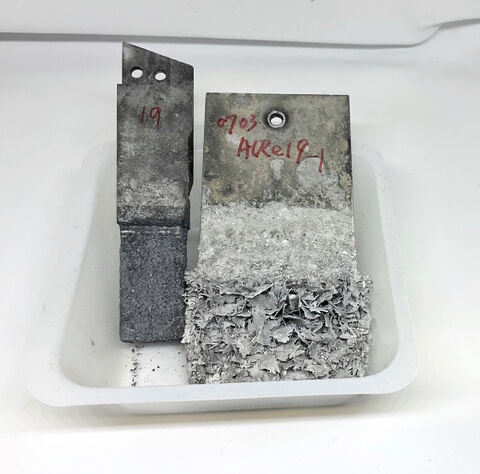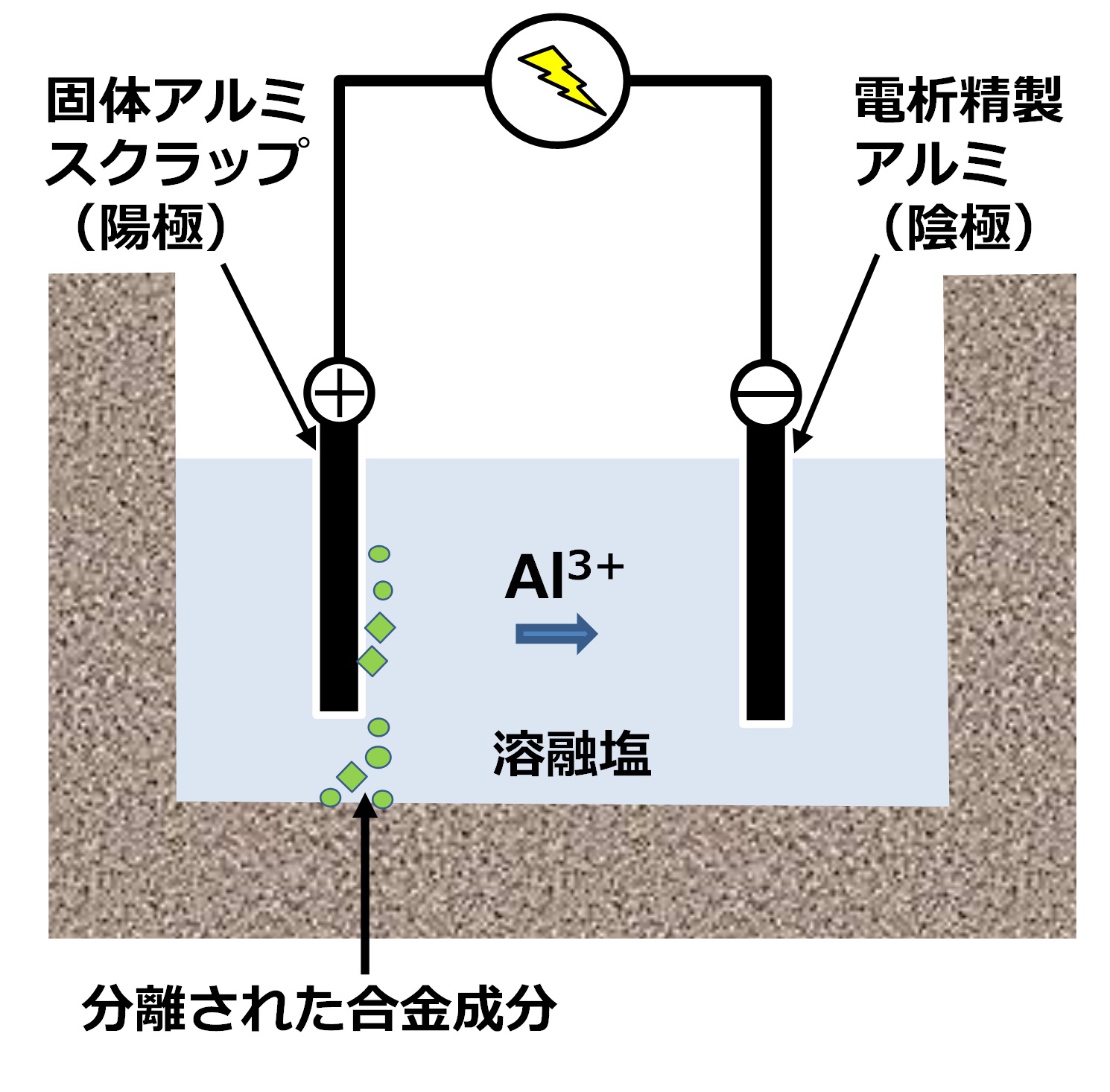

Tohoku Univアルミを高純度で再生:
Recycler l’aluminium à haute pureté :
Recyceln Sie Aluminium mit hoher Reinheit:
Recycle aluminum with high purity:
回收高純度鋁:
ー東北大グループが精製技術開発ー
東北大
大学院工学研究科4月26日
研究グループは、
「不純物が混じったアルミニウム廃材」を、「高純度アルミニウムに再生する」
新たな精製技術を開発した。
高純度アルミニウムに再生:
「再利用前より品質を向上させること」で、アルミの新たな循環に貢献できる。
今後5年間で実用化技術の開発を目指す。
成果は4月14日付の英科学誌ネイチャーに掲載された。
99.9%の純度:
研究グループは、
「不純物が含まれる鋳造材を溶かさずに、固体のままで電気分解する手法」を構築した。
- 500度のアルカリ塩化物に5時間漬けて、
- シリコンなどの合金元素と分離し、
- 99・9%の純度で、10gを精製した。
新技術の用途:
- EVの普及で、エンジンの需要が激減する。
- 2040年に、世界で360万トンが不要になる。
リサイクル構造が破綻する「アルミ危機」が懸念されている。
- 新地金から精製アルミをつくる工程に比べ、
- エネルギー消費量を半分以下に抑えられる。
環境負荷が軽減される。
河北新報:ONLINE NEWS
https://kahoku.news/articles/20220426khn000045.html
Université du Tohoku : Recycler l’aluminium à haute pureté :
-Tohoku University Group développe une technologie de raffinage-
Université du Tohoku
Ecole Supérieure d’Ingénieurs26 avril
Le groupe de recherche
“Régénérer les déchets d’aluminium mélangés à des impuretés” en aluminium de haute pureté
Développement d’une nouvelle technologie de raffinage.
Régénéré en aluminium de haute pureté :
En “améliorant la qualité avant réutilisation”, nous pouvons contribuer à la nouvelle circulation de l’aluminium.
Nous visons à développer une technologie pratique dans les 5 prochaines années.
Les résultats ont été publiés dans la revue scientifique anglaise Nature le 14 avril.
Pureté à 99,9 % :
Le groupe de recherche
Nous avons construit une “méthode d’électrolyse d’un matériau coulé contenant des impuretés sans le faire fondre sous forme solide”.
Faire tremper dans du chlorure alcalin à 500 degrés pendant 5 heures,
Séparé des éléments d’alliage tels que le silicium
10 g ont été purifiés avec une pureté de 99,9 %.
Applications aux nouvelles technologies :Avec la diffusion des véhicules électriques, la demande de moteurs va fortement chuter.
D’ici 2040, 3,6 millions de tonnes seront inutiles dans le monde.
On s’inquiète de la «crise de l’aluminium» dans laquelle la structure de recyclage s’effondre.Par rapport au processus de fabrication d’aluminium raffiné à partir de nouveau métal
La consommation d’énergie peut être réduite de moitié.
La charge environnementale est réduite.Kahoku Shimpo : NOUVELLES EN LIGNE
Universität Tohoku: Recyceln Sie Aluminium mit hoher Reinheit:
-Tohoku University Group entwickelt Raffinationstechnologie-
Tohoku-Universität
Graduiertenschule für Ingenieurwissenschaften26. April
Die Forschungsgruppe
„Regenerieren Sie mit Verunreinigungen vermischte Aluminiumabfälle“ zu hochreinem Aluminium
Entwickelte eine neue Raffinationstechnologie.
Zu hochreinem Aluminium regeneriert:
Durch die „Verbesserung der Qualität vor der Wiederverwendung“ können wir zur neuen Zirkulation von Aluminium beitragen.
Unser Ziel ist es, in den nächsten 5 Jahren praktische Technologie zu entwickeln.
Die Ergebnisse wurden am 14. April im englischen Wissenschaftsjournal Nature veröffentlicht.
99,9 % Reinheit:
Die Forschungsgruppe
Wir haben ein “Verfahren zum Elektrolysieren eines Gussmaterials, das Verunreinigungen enthält, ohne es als Feststoff zu schmelzen” konstruiert.
5 Stunden in Alkalichlorid bei 500 Grad einweichen,
Getrennt von Legierungselementen wie Silizium
10 g wurden mit einer Reinheit von 99,9 % gereinigt.
Anwendungen für neue Technologien:Mit der Verbreitung von Elektrofahrzeugen wird die Nachfrage nach Motoren stark zurückgehen.
Bis 2040 werden weltweit 3,6 Millionen Tonnen unnötig sein.
Sorge bereitet die „Aluminiumkrise“, in der die Recyclingstruktur zusammenbricht.Verglichen mit dem Prozess der Herstellung von raffiniertem Aluminium aus neuem Metall
Der Energieverbrauch kann auf weniger als die Hälfte reduziert werden.
Die Umweltbelastung wird reduziert.Kahoku Shimpo: ONLINE-NACHRICHTEN
A solid-state electrolysis process for upcycling aluminium scrap
Abstract
The recycling of aluminium scrap
today utilizing a remelting techniquedowngrades the quality of the aluminium and the final sink of this down-graded recycled aluminium is aluminium casting alloys1–9.
The predicted increase in demand for high grade aluminium as consumers choose battery-powered electric vehicles over internal combustion engine vehicles
is expected to be accompanied by a drop in the demand for low-grade recycled aluminium, which is mostly used in the production of internal combustion engines2,7,10,11.
To meet the demand for high-grade aluminium in the future,
a new aluminium recycling method capable of upgrading scrap to a level similar to that of primary aluminium is required2–4,7,11.
Here we propose a solid-state electrolysis (SSE) process using molten salts for upcycling aluminium scrap.
The SSE produces aluminium with a purity comparable to that of primary aluminium from aluminium casting alloys.
Moreover,
the energy consumption of the industrial SSE is estimated to be less than half that of the primary aluminium production process.By effectively recycling aluminium scrap, it could be possible to consistently meet our demand for high grade aluminium.
True sustainability in the aluminium cycle is foreseeable with the use of this efficient, low energy-consuming process.
Nature